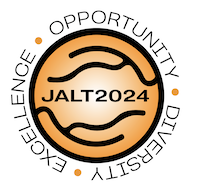JALT2024—Moving JALT Into the Future: Opportunity, Diversity, and Excellence
Dear PCP readers,
 As the Japan Association for Language Teaching Conference celebrates its golden jubilee this year, the Postconference Publication is also marking two big milestones. This 2024 issue marks our 30th year in existence and our 10th year as a publication rather than a simple set of proceedings. You might be wondering what the difference is and why it matters. Proceedings often read like summaries of what was presented at the conference. A publication, on the other hand, involves a thorough and stringent review process. Presenting at the JALT conference does not automatically mean that an author’s manuscript will appear in the PCP. Out of the hundreds of presentations given each year, only a few dozen manuscripts make it into the PCP.
As the Japan Association for Language Teaching Conference celebrates its golden jubilee this year, the Postconference Publication is also marking two big milestones. This 2024 issue marks our 30th year in existence and our 10th year as a publication rather than a simple set of proceedings. You might be wondering what the difference is and why it matters. Proceedings often read like summaries of what was presented at the conference. A publication, on the other hand, involves a thorough and stringent review process. Presenting at the JALT conference does not automatically mean that an author’s manuscript will appear in the PCP. Out of the hundreds of presentations given each year, only a few dozen manuscripts make it into the PCP.
Every submission goes through a careful evaluation before it can be accepted, and the authors you see in this issue put in many hours of work to revise their manuscripts through several stages of review. Their research topics are varied, but they share the common goal of furthering the field of education. The range includes classroom practices, content creation, teacher development, technology, quantitative research, and detailed case studies. Whatever your academic interests may be, you are bound to find at least one paper, and very likely several, that will capture your attention. I want to thank the authors who committed to our tight schedule, who put aside pride to refine their work, who came to us with strong manuscripts and still made thoughtful adjustments, and everyone who worked closely with our volunteers to make their writing shine. Thank you for your dedication.
The PCP is only possible because of our many volunteers. Some are just starting their academic journey, while others could probably recite APA 7 in their sleep. All of you have contributed to making our JALT community a better place through your expertise and your guidance. Some of you volunteered by reviewing papers. The attention to detail and the anonymous advice many of you gave to the authors were awe inspiring. Others worked directly with the authors to help them polish their papers to a publishable quality. Even when there were disagreements, I appreciated the care and advice all of you gave to the authors. Our copyediting team worked tirelessly to make sure the manuscripts followed APA 7 guidelines and our in-house formatting. This team knows APA 7 like the backs of their hands. I am grateful to every one of you, and I hope the authors know how lucky they have been to work with you.
I also want to thank the readers and researchers who open each new issue, who share it with colleagues, and who cite the articles within their own work year after year. I always feel a strong sense of pride when I see the PCP cited in articles within Japan and in the wider educational community. By reading and enjoying each new issue, you are contributing to the PCP in your own way. Thank you for reading our publication. Thank you for citing the authors, and thank you for keeping our community thriving.
It has been an honor to work with the PCP over the past few years. I have read every single submission since I began working with this publication, and it has been a pleasure to see the range of ideas and research our community is producing. As we celebrate JALT’s golden jubilee alongside 30 years of the PCP and a decade as a full publication, I hope this issue inspires you and gives you the same sense of pride in our JALT community. Here’s to the next 30 years of the PCP.
— Bethany Lacy
Editor – JALT2024: Moving JALT Into the Future: Opportunity, Diversity, and Excellence
Selected Papers
This section highlights four papers of exceptional quality that were chosen through consultation with the JALT Publication Board. We express our congratulations to these authors and our appreciation of their well-written papers.
- Basic Psychological Needs and Creativity in an EFL Context by Brian Birdsell
- Collaborative vs. Individual Writing in Japanese EFL High Schools: An Exploratory Study of L2 Writing Anxiety and Engagement by Naomi Sugahara
- Challenges of University English Teachers in Japan: A Preliminary Study by Saki Suemori
- How to Create Valid Reading Comprehension Tests to Measure Improvement by Sachi Oshima


